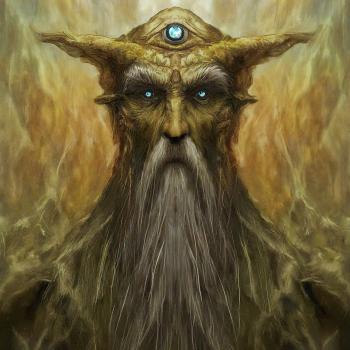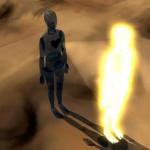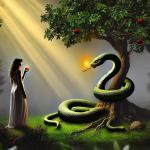Tribulation Force, pp. 279-282
Rayford Steele telephones Bruce Barnes for some last-minute advice on meeting with the Antichrist and here we are given another inadvertent glimpse of what constitutes virtue in the Left Behind universe:
Rayford Steele arrived at the United Nations. He had been praying silently since he phoned Bruce Barnes just before he boarded his flight. "I feel like I'm going to meet the devil," Rayford said. "Not much in this life scares me, Bruce. I've always taken pride in that. But I've got to tell you, this is awful."
So thoughts of the devil should fill you with a fearful anxiety, but taking pride in your own fearlessness isn't anything to worry about. If I were the devil, that's exactly the kind of attitude I'd be trying to encourage.
Bruce still seems to be struggling with his role here as Prof. Exposition. He's the guy with the library and the keeper of the Rev. Billings' sermon notes and videos, so he's supposed to be the one informing readers of just what it is our heroes are up against.
"First, Rayford, only if you were encountering the Antichrist in the second half of the Tribulation would you actually be dealing with the person who was possessed by Satan himself."
"So what is Carpathia? Some second-rate demon?"
"No."
Bruce doesn't offer a "second" to follow that "first" and he doesn't begin to address Rayford's question — "what is Carpathia?"
I can't blame Bruce for this. He can't play the helpful role played by Rupert Giles or Data or Obi Wan Kenobi because their job as Mr. Exposition was to inform the heroes of the nature of the enemy so that they would know what to do and so that they could vanquish that enemy. But poor Bruce is dealing with heroes who don't intend to do anything. The idea of vanquishing their enemy doesn't even occur to them. With such useless heroes, why shouldn't he offer only useless exposition?
Bruce's pedantic explanation of when precisely the Antichrist will become "possessed by Satan himself" is a detail that Tim LaHaye goes on about at great length in his writings about Bible prophecy. Like most of LaHaye's Bible prophecies, it is not actually prophesied in the Bible, but this is also another of LaHaye's idiosyncratic contributions to the standard Bible-prophecy template. Like his quirk of having the "Great Tribulation" begin after the treaty-signing instead of after the Rapture, or his idea of having the Two Witnesses show up before the Tribulation begins, this is a detail of "Bible prophecy" you won't find in most of his premillennial dispensationalist competitors' books.
That suggests, then, that the fictional Bruce Barnes must be consulting the books of the nonfictional Tim LaHaye — that Tim LaHaye, famous author of Bible-prophecy books, is also a character in the Bible-prophecy novels co-written by Tim LaHaye.
So here let me commend LaHaye and Jerry Jenkins for not making this more explicit. Let me commend them, in other words, for refraining from using Bruce's "studies" as a pretext for product placement. That phone call between Rayford and Bruce could have been much worse:
"I feel like I'm going to meet the devil," Rayford said. "Not much in this life scares me, Bruce. I've always taken pride in that. But I've got to tell you, this is awful."
"First, Rayford, I've been reading an excellent book from Pastor Billings' study called The Beginning of the End, by a brilliant author named Tim LaHaye and this book explains that only if you were encountering the Antichrist in the second half of the Tribulation would you actually be dealing with the person who was possessed by Satan himself."
"Wow, Bruce, that sounds like an insightful book that might provide an invaluable guide to the End Times."
"Yes, Rayford, it's one of several titles by Tim LaHaye available from Tyndale House — books that no real, true Christian should be without. …"
I'm sure they thought of doing something like that, yet they restrained themselves. That restraint is uncharacteristic. This whole volume, after all, is a cynical exercise in padding out what was originally conceived as a trilogy into a longer, and thus more lucrative, series. Authors capable of that kind of larceny wouldn't seem incapable of the kind of crass self-promotion I've imagined above. But for whatever reason, they opted not to indulge in it, and for that I am grateful.
Apart from product placement, though, the fact that Tim LaHaye's own books are clearly a central focus of Bruce's studies might also have been the basis for something more interesting. Think of what someone like Kurt Vonnegut might have made of the metafictional possibilities.
OK, wait, scratch that. The idea of Jerry Jenkins attempting something like that really isn't very appealing. So actually I'm grateful they didn't pursue that either.
Bruce tells Rayford he'll "need prayer support" during his meeting with Nicolae, just like the team provided for Buck.
"Buck is 10 years younger, and in better shape," Rayford said. "I feel as if I'll fall apart in there."
Rayford apparently thinks of himself as still 40. That might be a subtle poke at the captain's vanity, but allowing that these characters have any flaws goes against the established pattern in these books, so maybe it's instead just Jenkins' passive-aggressive swipe at his co-author.
Either way, I'm intrigued by this notion of getting in "shape" to duel the Antichrist's mind-control mojo. Does physical stamina somehow improve one's resistance? I thought only "prayer support" and being a Christian were effective at that. What exactly are the rules for how this superpower works? Mr. Exposition, unfortunately, isn't saying.
Rayford takes comfort in Bruce's promise of prayer:
… and it was particularly encouraging to know that Buck was in town. Just knowing he was in close proximity made Rayford feel less alone.
I get this. Knowing that you're not alone is a basic human need — even if the best you can come up with is the reassurance that some comrade is also somewhere in Manhattan. This has to be one of the more difficult aspects of embracing the antagonistic tribalism of LaHaye's brand of religion. To view oneself as a righteous remnant, perpetually besieged by a hostile world full of wicked people must be, on some level, sad and lonely.
While the authors remain vague about the specifics and mechanics of the Antichrist's evil superpowers, they are much clearer about the superpowers of Satan's other servants: Women.
Women, the authors teach, are evil, casting their wicked spells on helpless men, filling their innocent male minds with a sinful lust. And the only defense, according to the authors, is a protective shield of raw misogyny.
Hattie was waiting when he stepped off the elevator. He had hoped to have a moment to get the lay of the land, to freshen up, to take a deep breath. But there she stood in all her youthful beauty, more stunning than ever because of a tan and expensively tailored clothes on a frame that needed no help. He did not expect what he saw, and he sensed evil in the place when a flash of longing for her briefly invaded his mind.
See? Evil. Rayford is momentarily caught off guard but then, with God's help, he quickly recovers the deep, visceral contempt for women that he hopes can save him.
Rayford's old nature immediately reminded him why she had distracted him during a wintry season of his marriage. He prayed silently, thanking God for sparing him from having done something he would have regretted forever. And as soon as Hattie opened her mouth, he was brought back to reality. Her diction and articulation were more refined, but this was still a woman without a clue.
Confronted with the wanton evil of "a frame that needed no help," Rayford cried out to God for deliverance and the Lord responded by filling him with condescension and scorn, reminding him how much better he was than Hattie.
This is why Jesus taught us to pray, "God I thank you that I am not like other people — robbers, evildoers, adulterers." For all those who humiliate others will be exalted.
















